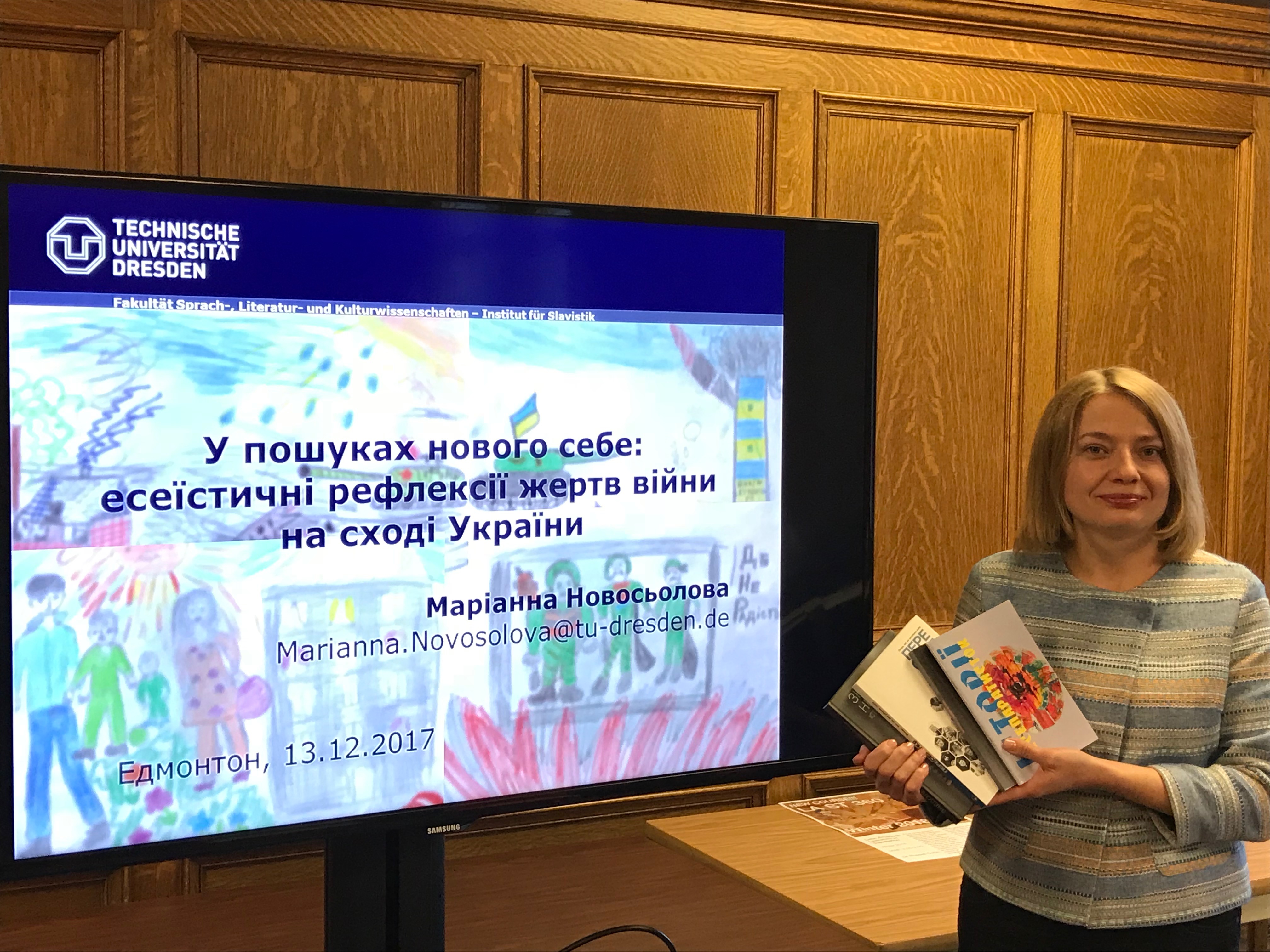Marianna Novosolova, Dresden Technical University, presented on reflective essays by victims of the war in Eastern Ukraine
27 December 2017

Marianna Novosolova during her lecture at the University of Alberta
On Wednesday, 13 December 2017, the Edmonton branch of the Shevchenko Scientific Society in Canada sponsored a presentation by Marianna Novosolova on the topic "In Search of Their New Selves: Reflective Essays by Victims of the War in Eastern Ukraine." This open lecture was arranged in conjunction with the University of Alberta's Department of Modern Languages and Culture Studies
(MLCS) and Ukrainian Language Education Centre (ULEC) at the Canadian Institute of Ukrainian Studies, as well as the German Academic Exchange Service (DAAD). Ms. Novosolova invited those present to consider the fates of internally displaced persons, who weresuddenly and mercilessly touched by war, forced to leave their homes and move to other regions ofUkraine in search of work and housing-but above all in search of their new selves. Many of them, sincere Ukrainian patriots, suffer from psychological distress. One the one hand, they are vilified bythose who remained in the renegade "republics" of the Donbas, branded with epithets such as "traitors," "fascists," and "Banderites." On the other hand, they are alienated and mistrusted by fellow Ukrainiancitizens whose perception is distorted by stereotypes, resulting in a guarded attitude towards "those Donetsk people," "separatists," "migrants," "bandits," etc. Their attempts to achieve understanding among themselves and with those around them have extended to a public expression of their reflections in essays ranging from philosophical analyses to "public confessions"; these have been published in the collections Istoriї neseparatystok (Non-separatist Women's Stories) and Donbas - Arena viiny (The Donbas: Arena of War), edited by Olena Taranenko.
Novosolova provided an analysis of these small narrative forms as a singular discourse with particular motives, pragmatic strategies, argumentation, nominations, and metaphorization, and described the successive transformation of identity in the forced migrants: (1) initial breakdown of social identity, caused by profound contradictions between public opinion and personal conviction, and exacerbated by the escalating idea of "outsiders"; (2) identification of outsiders as enemies and their explicit devaluation; (3) self-identification as outsiders among their own people; (4) identification of former friends as present outsiders; and (5) a sense of complete alienation and isolation. But at the same time, they have gradually overcome their identity crisis through internal reconsideration, rejection of binary
notions of right and wrong, psychological empathy with other displaced victims of the military conflict, and a symbolic entry into this new identity-group. The audience responded attentively to these issues and agreed that the combined recollections of this generation of victims of war in eastern Ukraine constitute a collective identity which is part of Ukrainian collective memory.
Marianna Novosolova holds a master's degree in journalism. She is a doctoral student and research assistant at the Institute of Slavonic Studies at the Dresden Technical University in Germany. Her research interests are carried out within the framework of cultural linguistics and are devoted to various aspects of discourse studies, particularly to scandal discourses. She participates in several international scientific projects and is a member of the German academic circle "JungslavistInnen." In December 2017 Ms. Novosolova was in Edmonton under the framework of an academic exchange between the Institute of Slavonic Studies at the Technical University of Dresden and the MLCS Department and ULEC at the University of Alberta.